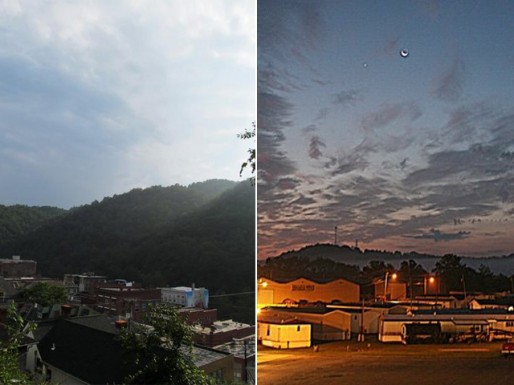
(Left) Downtown Welch, W.Va., the county seat of McDowell County, where Hollow takes place. (Right) Clarksburg, W.Va., where author Tricia Fulks grew up. (Photos by Tricia Fulks)
I can still distinctly remember the first time someone made fun of me for being from West Virginia – or at least the first time I realized I was being made fun for living somewhere.
I was visiting my cousins in Kentucky. I was in sixth grade, and I was sitting in my cousins’ bedroom, and we were playing catch-up since the last time we had seen each other. They had some friends from school over, and these two boys laughed when they heard where I hailed from.
“So, do you all wear shoes there?” one laughed. “Do you all have TVs and stuff?” the other joked.
I can’t remember now if at that point in my life I realized what they were doing, or if I answered them more matter-of-factly. Couldn’t they see I was wearing shoes?
And ever since that day, I’ve dealt with these stereotypes being thrown my way. There was a time when I wondered if it meant I should be ashamed of where I came from. If I was being told such things over the years, did it mean they were true? There were so many things people said about those from my beautiful state. They say we aren’t educated. That we’re lazy. That everyone here is on drugs and that it’s “all relative” (I’m looking to you Abercrombie & Fitch).
I loathe these stereotypes and these generalizations. Always have. Always will. And I realized that I’m the one who shouldn’t be ashamed, and that only you’ve got to change the minds of those who think this way.
Enter Hollow.
Many people of McDowell County, W.Va., feel that while the rest of the state hears unflattering stereotypes and media portrayals, they get the worst of it. Prior to spending time in McDowell County last summer, I had the stereotypes hurled at me again – the worst part…some of them came from citizens of my own state.
“Are you going to survive the summer?” “It’s like ‘Deliverance’ down there, isn’t it?” “So what’s this project about? Incest?”
To answer all these questions, yes, no and no.
It’s not always those “on the outside” who have to be educated. I’m hoping Hollow opens the eyes of many. I hope it shines light on what it’s like in small-town America, in a boom-and-bust economy, and I hope that users of the experience realize that the subjects of project are just like them. They are hard-working West Virginians who love their family and their home. They want people to know their story, their history and their culture. They want to see a change in their communities – for the better – and they want to be a part of it.
If you talk to most West Virginians, they are proud to be from the Mountain State. But if you talk to a McDowell County native, he is even more proud to be from “The County,” as they call it.
